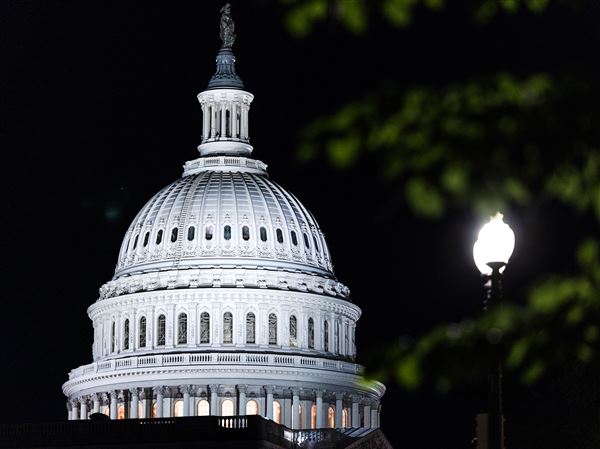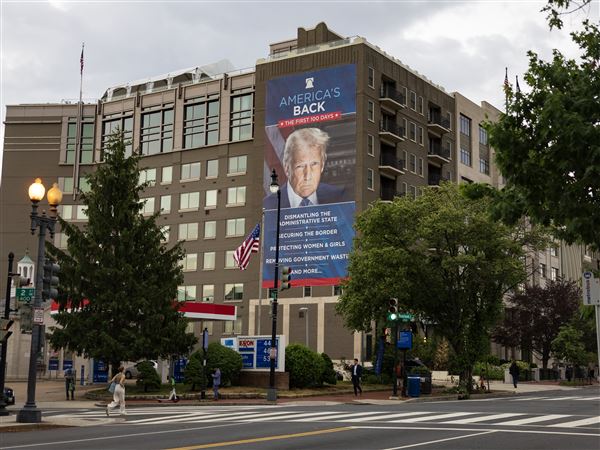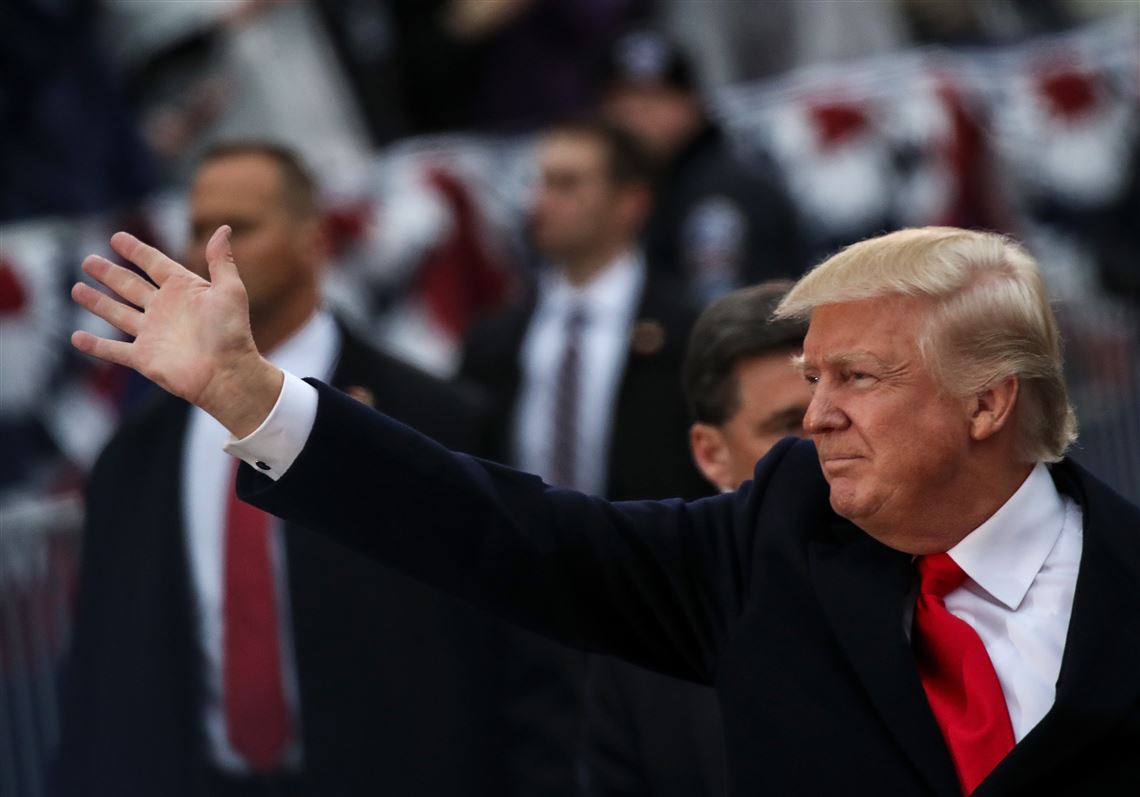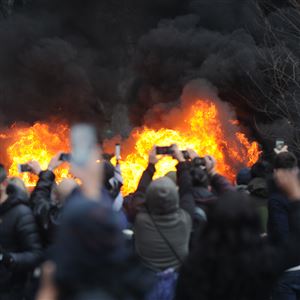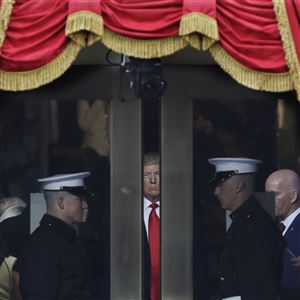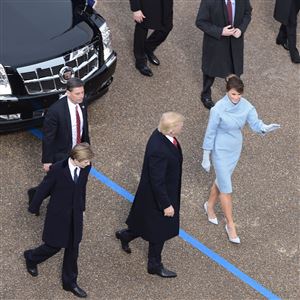WASHINGTON — Donald J. Trump made his presence and presidency known with blunt words, a fist pump and a promise to give power to the people in a system based on “total allegiance to the United States of America.”
Mr. Trump was sworn in as the 45th president of the United States Friday, taking command of a divided nation and ushering in an unpredictable era in Washington. He starts his tenure with Republicans in control of the White House and Congress, yet his approval ratings are low and his populism has discomfited some members of his own party as well as Democrats.
Facing a crowd sprawled across the National Mall and speaking over competing chants of approval and protest, he pledged in his 16-minute speech to empower America’s “forgotten men and women.”
IMAGES | SOCIAL REACTION | READ FULL SPEECH
As he had during his campaign as the Republican nominee, he portrayed the nation as violent and economically shattered, lamenting “American carnage,” closed factories and weak U.S. leadership.
He disparaged D.C., ripping into Washington’s longtime leaders as he stood among them at the U.S. Capitol. He charged that the powerbrokers had flourished while the people suffered.
He focused on nationalism — “at the bedrock of our politics will be a total allegiance to the United States of America” — and patriotism in the speech. All decisions would be based on American interest, he said, invoking the “America First” slogan.
“From this day forward, a new vision will govern our land. From this day forward, it’s going to be only, ‘America First,‘” Mr. Trump said.
In the afternoon after his swearing in, he signed an order for a National Day of Patriotism.
He vowed to bring jobs back to the United States, and “eradicate completely” Islamic terrorism.
While his inauguration did draw crowds to the nation’s capital, the numbers appeared smaller than for past celebrations, and thousands were there to protest rather than celebrate his presidency.
Demonstrations bubbled up at several security checkpoints near the Capitol as protesters waited with ticket-holders to gain admittance. In some cases protesters locked arms to block Trump supporters and police officers helped ticket-holders get through. After the swearing-in, more protesters registered their rage in the streets of Washington. Police in riot gear deployed pepper spray and made dozens of arrests after protesters smashed the windows of downtown businesses, denouncing capitalism and Trump.
There was scant attention paid to the Republican Party’s bedrock principles: small government, social conservativism and robust American leadership around the world. Mr. Trump repeatedly referenced the forgotten, but made some references to the unity and inclusiveness that critics had said was lacking in his campaign: “To all Americans in every city near and far, small and large from mountain to mountain, from ocean to ocean, hear these words: You will never be ignored again,” he said.
The new president was sworn in by Chief Justice John Roberts, reciting the 35-word oath with his hand placed upon two Bibles, one used by his family and another during President Abraham Lincoln’s inauguration.
Mr. Trump and wife, Melania, bid Mr. Obama and outgoing first lady Michelle Obama farewell as they departed the Capitol grounds in a government helicopter. Before running for the White House, the billionaire businessman led efforts to promote falsehoods about the 44th president’s citizenship and claim on the office.
Mr. Obama addressed a staff gathering at Joint Base Andrews before departing for a vacation in California. “You proved the power of hope,” he said.
His successor tapped more into fear and anger. He defied his party’s establishment, expertly used the media while infuriating journalists and toppled the Bush and Clinton political dynasties on his way to victory. His message, calling for a resurgence of white, working-class corners of America, was packaged in defiant stump speeches railing against political correctness. He used social media to dominate the national conversation and challenge conventions about political discourse.
But Mr. Trump’s call for restrictive immigration measures and his harsh campaign rhetoric about women and minorities angered millions. And Mr. Trump’s swearing-in was shadowed by questions about his ties to Russia, which U.S. intelligence agencies have determined worked to tip the 2016 election in his favor.
More than 60 House Democrats refused to attend his swearing in ceremony in the shadow of the Capitol dome. One Democrat who did sit among the dignitaries was Hillary Clinton, who was widely expected by both parties to be the one taking the oath of office but lost to him in an upset.
At a post-ceremony luncheon at the Capitol, Mr. Trump asked the Republicans and Democrats present to recognize her, and those in the room rose and applauded.
At 70, Mr. Trump is the oldest person to be sworn in as president, marking a generational step backward after two terms for Mr. Obama, one of the youngest presidents to serve as commander in chief.
Mr. Trump faces challenges as the first president to take office without ever having held a political position or served in the military. He has stacked his Cabinet with established Washington figures and wealthy business leaders. Though his team’s conservative bent has been cheered by many Republicans, the overwhelmingly white and male Cabinet has been criticized for a lack of diversity.
In a show of solidarity, all of the living American presidents attended Trump’s inaugural, except for 92-year-old George H.W. Bush, who was hospitalized this week with pneumonia. His wife, Barbara, was also admitted to the hospital after falling ill.
Mr. Trump’s address sounded much like his campaign stump speeches, and one firebrand from the 1980s who also disrupted D.C. said the new president might just keep acting like the candidate.
“He’ll be successful if he can keep doing 20,000-person events on the road, and now he’ll be campaigning on behalf of the American people,” former U.S. House speaker Newt Gingrich said after Mr. Trump’s swearing-in ceremony.
The new president is an anti-establishment Washington adversary, and that’s why the people elected him, said Mr. Gingrich, a Georgia Republican.
The crowd seemed to love Mr. Trump’s remarks about empowering the people — and so did U.S. Rep. Tom Marino, R-Lycoming.
"He’s more about the American people than the government. He told the people 'You control us. You control the government,'" said Mr. Marino, who agrees with the sentiment. "It's this populist movement that's going to turn around our country."
U.S. Rep. Scott Perry found the new president’s inaugural address inspirational and aspirational.
“He let everyone now what his priorities are,” Mr. Perry, R-York, said in an interview in the U.S. Capitol after the speech.
Whether he’ll be able to achieve them is a different matter.
“The big issues – health care, immigration and tax reform – are all intractable issues. Nobody expects it to be easy,” Mr. Perry said.
House Transportation Committee Chairman Bill Shuster, R-Bedford, was encouraged that Mr. Trump counted infrastructure improvement among his goals.
“It was a strong speech and one that I think will help set the right tone,” Mr. Shuster said.
Mr. Trump has a lot on his agenda, and the congressman acknowledged that it will be hard to get it all done.
“You’ve got to set high goals. If he falls a little short, that’s still going a long way,” Mr. Shuster said.
The Associated Press contributed. Staff Writers Julian Routh and Gretchen McKay contributed.
First Published: January 20, 2017, 11:37 p.m.

